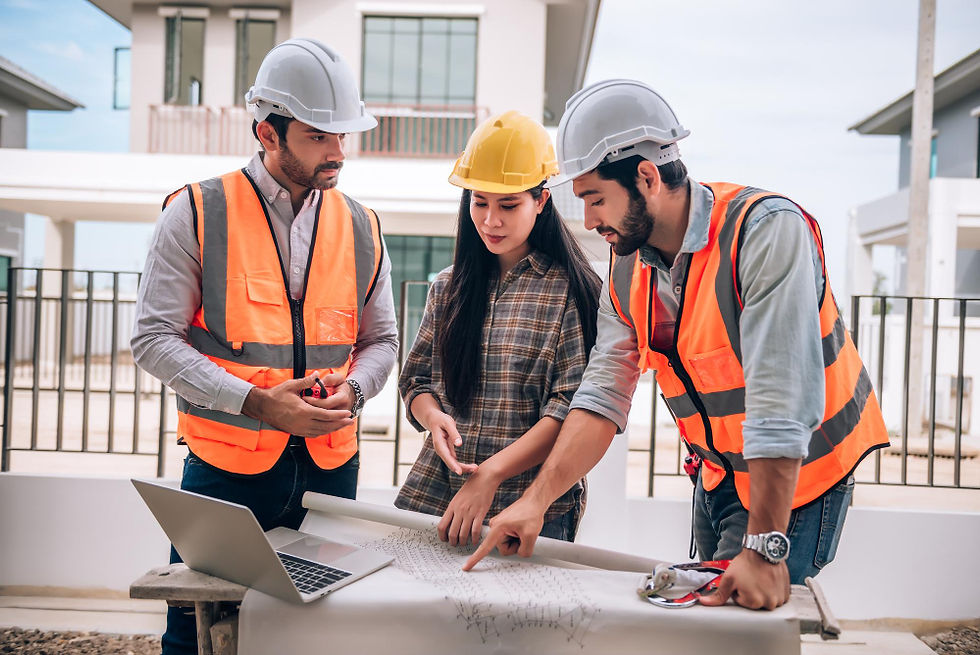Understanding the Legalities of Building Your Own Home
- shibaniagarwal1234
- May 17, 2024
- 3 min read

Building your own home is an exciting venture, but it comes with a myriad of legal considerations that can make or break your project. Understanding these legalities ensures a smoother construction process, avoiding potential legal pitfalls and ensuring compliance with local regulations. Whether you're a seasoned builder or a first-time homebuyer, grasping these aspects is crucial.
Permits and Approvals
One of the first steps in your home construction journey is obtaining the necessary permits and approvals from local authorities. These permits ensure that your construction adheres to zoning laws, building codes, and safety regulations. Common permits include:
Building Permit: Authorizes construction and ensures compliance with local building codes.
Zoning Permit: Confirms that the land is designated for residential use.
Environmental Permits: Required if your construction impacts local ecosystems.
Failing to secure these permits can result in hefty fines, legal disputes, or even demolition of unauthorised structures.
Land Ownership and Title Deeds
Before construction begins, verifying the ownership of the land is paramount. Ensuring that the title deed is clear and free of disputes protects you from future legal hassles. It's advisable to conduct a thorough title search and, if necessary, obtain title insurance. This step confirms that the seller has the right to sell the property and that there are no encumbrances or legal claims against it.
Construction Contracts
Entering into a clear and comprehensive contract with your home construction company is essential. This contract should outline the scope of work, timelines, payment schedules, and dispute resolution mechanisms. Key elements to include are:
Project Scope: Detailed description of the work to be done.
Timeline: Specific start and completion dates.
Payment Terms: Milestone-based payments linked to project progress.
Warranties and Guarantees: Coverage for workmanship and materials.
Termination Clause: Conditions under which the contract can be terminated.
A well-drafted contract minimises misunderstandings and provides legal recourse in case of disputes.
Insurance and Liability
Construction projects are fraught with risks, making insurance an indispensable part of your legal strategy. Types of insurance to consider include:
Builder's Risk Insurance: Covers damages to the building under construction.
General Liability Insurance: Protects against third-party claims for injuries or property damage.
Worker's Compensation Insurance: Mandatory if you have hired labourers, covering their medical expenses and lost wages due to work-related injuries.
Adequate insurance coverage safeguards your investment and mitigates financial risks.
Adherence to Building Codes
Building codes are regulations that set standards for construction quality and safety. Compliance with these codes is mandatory and is enforced through inspections at various stages of the construction process. These inspections ensure that the construction meets minimum standards for:
Structural Integrity: Ensuring the building is safe and stable.
Electrical Systems: Proper installation and safety of electrical wiring and devices.
Plumbing Systems: Safe and efficient water supply and waste disposal.
Fire Safety: Adequate fire prevention and control measures.
Non-compliance can lead to fines, delays, and even the necessity to redo work, escalating costs.
Environmental Considerations
Environmental regulations aim to minimise the ecological impact of construction activities. These laws cover aspects such as:
Waste Management: Proper disposal of construction debris.
Erosion Control: Measures to prevent soil erosion during and after construction.
Protection of Natural Resources: Ensuring that nearby water bodies and green spaces are not adversely affected.
Following these regulations not only ensures legal compliance but also promotes sustainable building practices.
Choosing the correct constructors
Navigating the legal landscape of home construction can be complex, but it's a vital part of bringing your dream home to life. Engaging a reliable home construction company can simplify this process, ensuring that all legal requirements are met efficiently. Companies like GharEka, known for their comprehensive understanding of construction regulations, can be invaluable partners in your home-building journey. By staying informed and proactive, you can mitigate risks and ensure a smooth and legally compliant construction process.
Experience and Reputation: Opt for constructors with a proven track record. GharEka partners with experienced professionals known for their reliability.
Quality of Work: Inspect previous projects for craftsmanship and adherence to building codes. GharEka ensures access to high-quality constructors.
Transparent Pricing: Choose constructors who provide clear and detailed estimates. GharEka emphasises transparent pricing to help you plan effectively.
Customer Reviews: Look for positive testimonials from previous clients. GharEka features reviews to help you select trusted constructors.
Project Management: Effective project managers are crucial for timely completion. GharEka’s network includes skilled project managers for smooth execution.
Communication Skills: Ensure constructors are responsive and communicative. GharEka facilitates open communication channels.
Licenses and Insurance: Verify that constructors have the necessary licenses and insurance. GharEka verifies these credentials for your peace of mind.
Sustainability Practices: Choose constructors who use eco-friendly materials and energy-efficient solutions. GharEka promotes sustainable building practices.
Building your own home is a rewarding endeavour, and with the right legal knowledge, you can turn your dream into a reality without unnecessary legal hurdles.



Comments